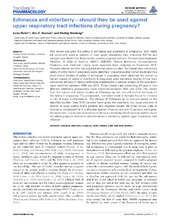| dc.contributor.author | Holst, Lone | en_US |
| dc.contributor.author | Havnen, Gro Cecilie | en_US |
| dc.contributor.author | Nordeng, Hedvig | en_US |
| dc.date.accessioned | 2014-12-19T12:11:47Z | |
| dc.date.available | 2014-12-19T12:11:47Z | |
| dc.date.issued | 2014-03-04 | eng |
| dc.identifier.issn | 1663-9812 | |
| dc.identifier.uri | https://hdl.handle.net/1956/8992 | |
| dc.description.abstract | This review evaluates the safety of echinacea and elderberry in pregnancy. Both herbs are commonly used to prevent or treat upper respiratory tract infections (URTIs) and surveys have shown that they are also used by pregnant women. The electronic databases PubMed, ISI Web of Science, AMED, EMBASE, Natural Medicines Comprehensive Database, and Cochrane Library were searched from inception to November 2013. Relevant references from the acquired articles were included. No clinical trials concerning safety of either herb in pregnancy were identified. One prospective human study and two small animal studies of safety of echinacea in pregnancy were identified. No animal- or human studies of safety of elderberry in pregnancy were identified. Twenty clinical trials concerning efficacy of various echinacea preparations in various groups of the population were identified between 1995 and 2013. Three clinical trials concerning efficacy of two different elderberry preparations were identified between 1995 and 2013. The results from the human and animal studies of Echinacea sp. are not sufficient to conclude on the safety in pregnancy. The prospective, controlled study in humans found no increase in risk of major malformations. The efficacy of Echinacea sp. is dubious based on the identified studies. Over 2000 persons were given the treatment, but equal amounts of studies of good quality found positive and negative results. All three clinical trials of Elderberry concluded that it is effective against influenza, but only 77 persons were given the treatment. Due to lack of evidence of efficacy and safety, health care personnel should not advice pregnant women to use echinacea or elderberry against upper respiratory tract infection. | en_US |
| dc.language.iso | eng | eng |
| dc.publisher | Frontiers | eng |
| dc.rights | Attribution CC BY | eng |
| dc.rights.uri | http://creativecommons.org/licenses/by/3.0/ | eng |
| dc.subject | Echinacea | eng |
| dc.subject | Elderberry | eng |
| dc.subject | Pregnancy | eng |
| dc.subject | Safety | eng |
| dc.subject | Efficacy | eng |
| dc.subject | CAM | eng |
| dc.subject | respiratory infection | eng |
| dc.title | Echinacea and elderberry—should they be used against upper respiratory tract infections during pregnancy? | en_US |
| dc.type | Peer reviewed | |
| dc.type | Journal article | |
| dc.description.version | publishedVersion | en_US |
| dc.rights.holder | Copyright 2014 Holst, Havnen and Nordeng | |
| dc.source.articlenumber | 31 | |
| dc.identifier.doi | https://doi.org/10.3389/fphar.2014.00031 | |
| dc.identifier.cristin | 1197868 | |
| dc.source.journal | Frontiers in Pharmacology | |
| dc.source.40 | 5 | |

